Jimmy Galligan, Moral Monster

The New York Times has a story about a young man, Jimmy Galligan, who is an example of the kind of moral monsters this culture of ours has created.
His mother is black, his father white. He went to high school in Leesburg, Va. Four years ago, a girl in his class, Mimi Groves, used an antiblack racial slur in a Snapchat video lasting three seconds, and sent privately to a friend. Somebody showed him the clip. He saved it, and waited for his chance.
Mr. Galligan had not seen the video before receiving it last school year, when he and Ms. Groves were seniors. By then, she was a varsity cheer captain who dreamed of attending the University of Tennessee, Knoxville, whose cheer team was the reigning national champion. When she made the team in May, her parents celebrated with a cake and orange balloons, the university’s official color.
The next month, as protests were sweeping the nation after the police killing of George Floyd, Ms. Groves, in a public Instagram post, urged people to “protest, donate, sign a petition, rally, do something” in support of the Black Lives Matter movement.
You might think that Galligan would rejoice in the fact that his classmate, who as a freshman had used a racial slur, had changed, had matured, had become more sensitive. Nope. More:
“You have the audacity to post this, after saying the N-word,” responded someone whom Ms. Groves said she did not know.
Her alarm at the stranger’s comment turned to panic as friends began calling, directing her to the source of a brewing social media furor. Mr. Galligan, who had waited until Ms. Groves had chosen a college, had publicly posted the video that afternoon. Within hours, it had been shared to Snapchat, TikTok and Twitter, where furious calls mounted for the University of Tennessee to revoke its admission offer.
The university forced Mimi Groves’s parents to withdraw her. She now lives at home with them and attends a community college. More:
Ms. Groves’s parents, who said their daughter was being targeted by a social media “mob” for a mistake she made as an adolescent, urged university officials to assess her character by speaking with her high school and cheer coaches. Instead, admissions officials gave her an ultimatum: withdraw or the university would rescind her offer of admission.
“We just needed it to stop, so we withdrew her,” said Mrs. Groves, adding that the entire experience had “vaporized” 12 years of her daughter’s hard work. “They rushed to judgment and unfortunately it’s going to affect her for the rest of her life.”
Jimmy Galligan goes to college in California. He is proud of having ruined Mimi Groves’s college experience:
One of Ms. Groves’s friends, who is Black, said Ms. Groves had personally apologized for the video long before it went viral. Once it did in June, the friend defended Ms. Groves online, prompting criticism from strangers and fellow students. “We’re supposed to educate people,” she wrote in a Snapchat post, “not ruin their lives all because you want to feel a sense of empowerment.”
For his role, Mr. Galligan said he had no regrets. “If I never posted that video, nothing would have ever happened,” he said. And because the internet never forgets, the clip will always be available to watch.
“I’m going to remind myself, you started something,” he said with satisfaction. “You taught someone a lesson.”
Read it all. What a horrible person that Galligan kid is. Notice too how the black friend who accepted Mimi Groves’s apology (delivered before the clip became a big thing), defended Mimi Groves, and got bashed on social media for it. Mercy is a crime in this world we have created.
The Times story focuses heavily on antiblack racism in the language used at that particular high school. If true, then it’s awful, and those kids should not be talking that way. But come on, these are high school kids. The kids who bullied me (with physical assaults as well as vicious words) when I was in high school never apologized, but I am sure if I confronted them about it, they would. I don’t need an apology from them. I wrote a book in which I talked about leaving my hometown for another school because of being bullied. Had I wanted to hurt the people who hurt me back then, I could have named them and caused them public shame. Who wants to be remembered by name by the author of a New York Times bestselling book? But why would I do that? Why would I want their children to know that their parents had behaved so horribly in high school? What could possibly be gained by that act of vengeance? They might have forgotten what they did to me. Maybe it was nothing to them, though it was everything to me when I was 14 and 15. But kids can be terrible to each other.
And let me be honest with myself: How much hurt did I bring to people in high school without being aware of what I was doing? I can think of a particular incident at my new school in which I participated in the humiliation of an unpopular student. I am ashamed of it. If I ever saw this guy again, I would have to man up and apologize. It did not involve bigotry, but it was much worse than this Galligan kid hearing an old clip of a classmate saying the N-word in a clip four years earlier.
The context of the Times story might make it seem that Galligan’s vengeful act might have been a necessary part of fighting cultural racism in that school. The lives of individuals don’t matter here; what matters is that Mimi Groves was a representative of a hated class: privileged white people. Galligan even tells a story about chastising his own white father about white privilege. What a life-giving ideology antiracism is: teaching people to despise their own parents in the name of social justice.
My middle son is about to be 17 years old, and doesn’t understand why his parents won’t let him have social media. My kids were all raised to think of racism as evil, and never, ever to use racial slurs. But so was Mimi Groves. She made a mistake. A single mistake, though, involving a politically potent topic, and recorded on the Internet, was all it took to destroy her college career, and to have that clip remain forever on the Internet to hurt her. Mimi Stokes’s repentance before it went viral helped her not one bit. I cannot imagine what mistake my son might make that could be recorded on his social media account (were he to get one), and hurt him in ways he can’t yet foresee, because he’s a teenager, and not great at grasping the long-term consequences of inappropriate actions. Besides, what thing might he say that’s innocent today, but tomorrow will be regarded as an example of intolerable vice? What a curse it is growing up in this merciless culture, where people police each other moralistically, and believe themselves virtuous in destroying the impure and flawed. There is no room for error. I would be angry at my kid if he or she used a racial slur, but proud of them if they admitted error, and apologized to those they offended. I would be horrified if my kid ever did to someone who offended them what Jimmy Galligan has done to Mimi Groves (who, note well, did not utter that slur to Galligan).
This Times story will follow Jimmy Galligan everywhere too. If that kid applied for a job at my firm, I would never hire him. If he were my co-worker, I would stay away from him, lest I offend him and get the Little- Anthony-from-The-Twilight-Zone treatment. He has shown the kind of person he is: a hateful progressive who takes pleasure in causing others unnecessary pain and suffering for the sake of virtue. He wants to terrorize others. Everybody who goes to college with him now, and who crosses his path, should consider themselves forewarned.
We will always live in a society that is in need of moral reform. We are human. But it is a monstrous society that doesn’t offer a way for people to turn from their sins and failings, and find forgiveness and restoration.
UPDATE: Sorry, I called the young woman “Mimi Stokes” a couple of times. Thanks to the readers who pointed out the error. I fixed it.
UPDATE.2: A reader comments:
Hey there, I’m a class of 07 alumn of the High School mentioned in the NYT, Heritage High School. My wife graduated there in ‘08, and my sister in law in 2016. I am white, they are both not. We all emphatically agree that the NYT description of the racial environment at HHS is 100% overblown. There were absolutely no “hurling of racial slurs at black students by white students.” I hung with a pretty rough crowd (of all races), never heard that word once. Maybe there were some jackass jocks who joked around about it, but on the whole it was a diverse, tolerant place.
Either kids have gotten radically more explicitly in the past few years, or they’ve gotten better at exaggerating, or both. Whatever it is, social media is likely responsible.
Oh, and yeah, this kid’s a jerk.
UPDATE.3: Reader Jonah R.:
I want to highlight something Rod wrote in this post that has gone mostly unnoticed:
“And let me be honest with myself: How much hurt did I bring to people in
high school without being aware of what I was doing? I can think of a
particular incident at my new school in which I participated in the
humiliation of an unpopular student. I am ashamed of it. If I ever saw
this guy again, I would have to man up and apologize.”This is a huge point, especially in the decade since everyone started focusing on “bullying.” Everyone wants to claim the mantle of bullying victim, but nobody wants to admit to having been a bully.
Well, I was the former and to a lesser extent, I was the latter too. Even though I faced relentless bullying in high school, including physical assaults, I still found smaller ways to inflict my helplessness on the kids who were even lower on the totem pole than I was, in the form of snide, hurtful comments, often as part of a group. When we’re so busy defending ourselves on one front, we don’t give much thought to the ones we harm on the other front. Many of the bullied kids I knew went on to treat others badly in their 20s. Some of the most bullied Gen X and Millennial kids are now the worst bullies themselves in their roles as social media thought police or leaders of “cancel culture” in publishing, at universities, and so on.
We need to get over this idea that being bullied conveys sainthood, enlightenment, and sensitivity. It doesn’t. It makes a kid bitter and self-righteous and too focused on victimhood, and in my experience all that does is breed more bullying. The Jimmy Galligan story only provides further evidence of that for me. And now that we’ve defined “bullying” down to mean a few stray slurs by immature fools or even a minor social snub, we’re going to see more Galligan-esque retribution, not less.
UPDATE.4: A reader e-mails:
I do want to bring your attention to something someone said in response to this story. The following tweet is precisely why cancel culture has become so normalized and accepted without contest:
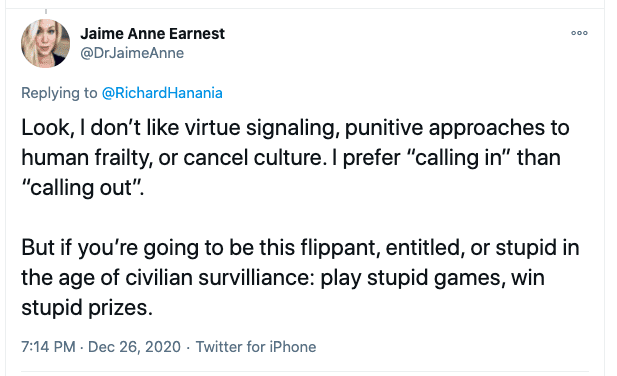
Earnest is an epidemiologist. The reader continues:
While there’s a certain logic to this remark (watch what you say), we’re talking about a 15-year-old. We’re talking about a 15-year-old who was targeted for destruction by a classmate who clearly didn’t have the courage or moral fortitude to address the issue when it happened. Jimmy Galligan did this for his own ego, not out of a pursuit for justice.
As for Jaime Anne Earnest, she’s basically saying cancel culture’s something she’s accepted as the price of living in a America, like it were paying taxes or something. None of us like paying taxes, but you better pay them, or else, you’re going to jail! In fact, the following tweet of hers shows that everything she said about not liking cancel culture was just “disassembling,” as someone else described it, to mask her true feelings about the matter:
The reader concludes:
That’s the irony of cancel culture. There are very few people out there who actually like it, whether in practice or principle. I assure you, if Jaime Anne Earnest were canceled, she’d be crying bloody murder, she certainly wouldn’t accept it as a legitimate response to her personal failure. But cancel culture prevails not because of the extremists, but because of people like Earnest, who either don’t see it as a big problem or because they, in their hearts of hearts, see it as a fair-and-square consequence of your actions. Until the public, en masse, pushes back against cancel culture, i.e., by taking the fight straight to the Jimmy Galligans of the world, then cancel culture will continue to be the norm.
I realize that sounds frightening to a lot of people. But we all know, from history, that totalitarians were never defeated at the ballot box. They were never defeated through appeasement and negotiation. And they certainly weren’t defeated through kindness and normalization. I’m not calling for people to fight, but we all should understand that this sort of thing will continue unabated unless Jimmy Galligan and other totalitarians like him begin paying an equal and opposite cost for this sort of behavior.
Another reader writes:
I would add that it is ironic that Jimmy Galligan chose and was accepted to a Christian university. I do not pretend to speak for Christianity, but I am certain the principles of vengeance, cruelty and sadistic pleasure in one’s pain is anathema to the tenets of that faith.
If you ever encounter Ms. Groves in a follow up story I will hire her on whatever I am working on, when she completes her studies.
I hope Mr. Galligan focuses his efforts on the music industry and cultural touchstones that treat the slur as some sort of shibboleth.
In closing, perhaps we should all share a Christian prayer for Mr. Galligan, so that when he inevitably makes a slip up somewhere in life, someone with an iPhone is not waiting to extinguish him.
UPDATE.5: A reader found Jimmy Galligan’s Twitter account via some Internet sleuthing. It’s not private (yet), and I’m not going to reveal it. But the reader found some Galligan tweets that are relevant to this story. I present them below (and some I found). I’ve hidden his Twitter handle. This is his face:
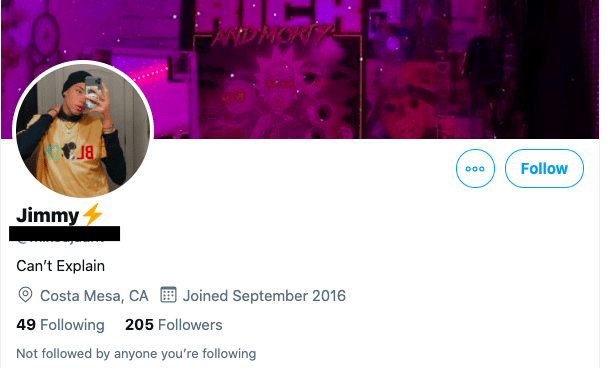
Look, he appears to hate himself:
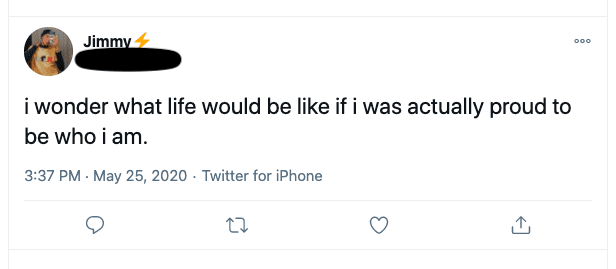
Hmm:
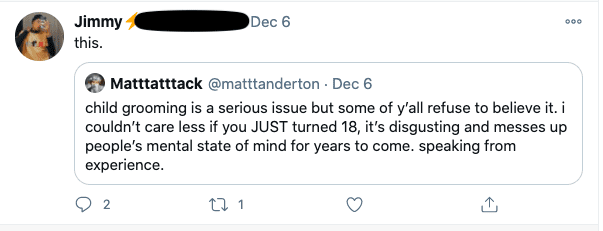
He takes pleasure in the idea of punishing people who even slightly trouble him:
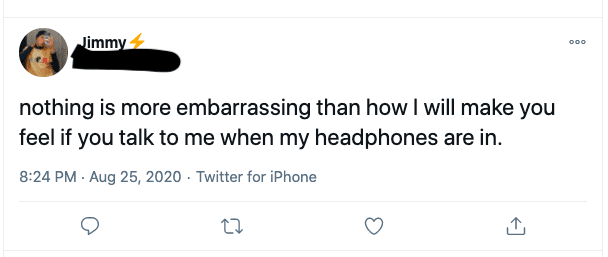
He hates where he’s from (Northern Virginia):
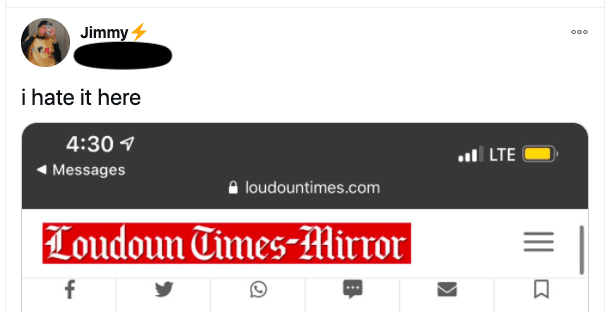
He’s working out some issues:
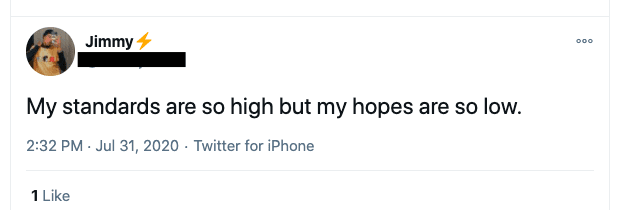
He’s not always offended by the use of the N-word:

He loves doxxing:
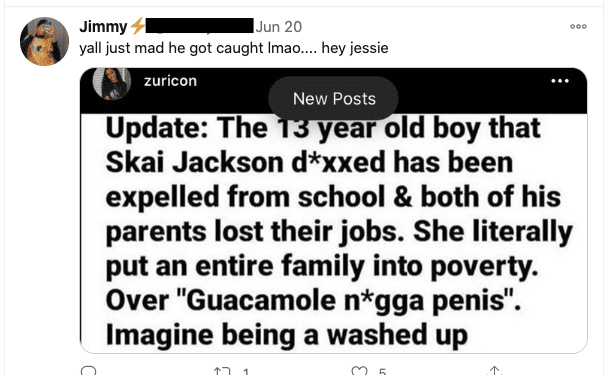
And yet!

But Jimmy Galligan saw to it that a young woman’s college career was ruined over something she snapchatted in 2016, as a high school freshman, and apologized for before many people knew about it. So proud of himself he bragged about his virtuous act to The New York Times, and allowed himself to be photographed by them. The man identified in the Times photo as Jimmy Galligan looks exactly like “Jimmy” in the Twitter account, which is connected to some other students at Galligan’s college. A Christian college — imagine that.
Earlier this year, he admitted to his Twitter followers that he isn’t proud to be who he is. Well, did he attempt to buy some self-esteem by destroying the college hopes of this Groves girl? One has to hope that he will mature enough to be ashamed of who he is, over what he did, and boasted of doing. Otherwise, he’s sunk.

Subscribe for as little as $5/mo to start commenting on Rod’s blog.